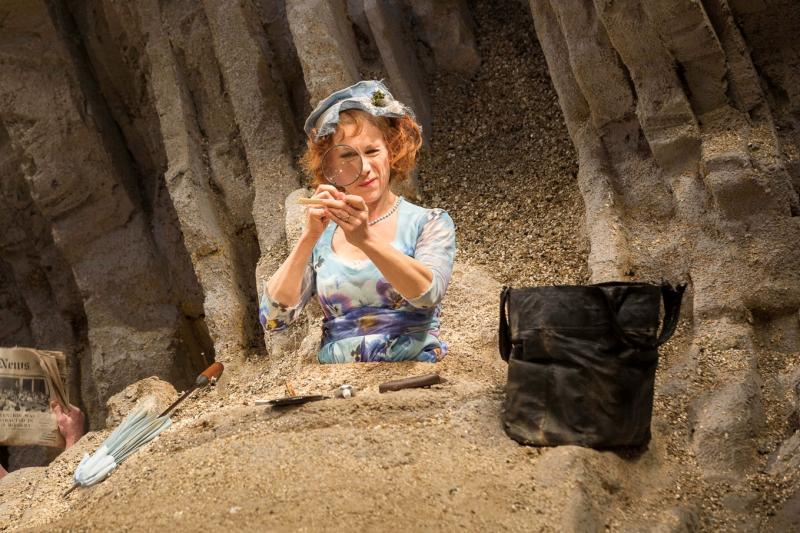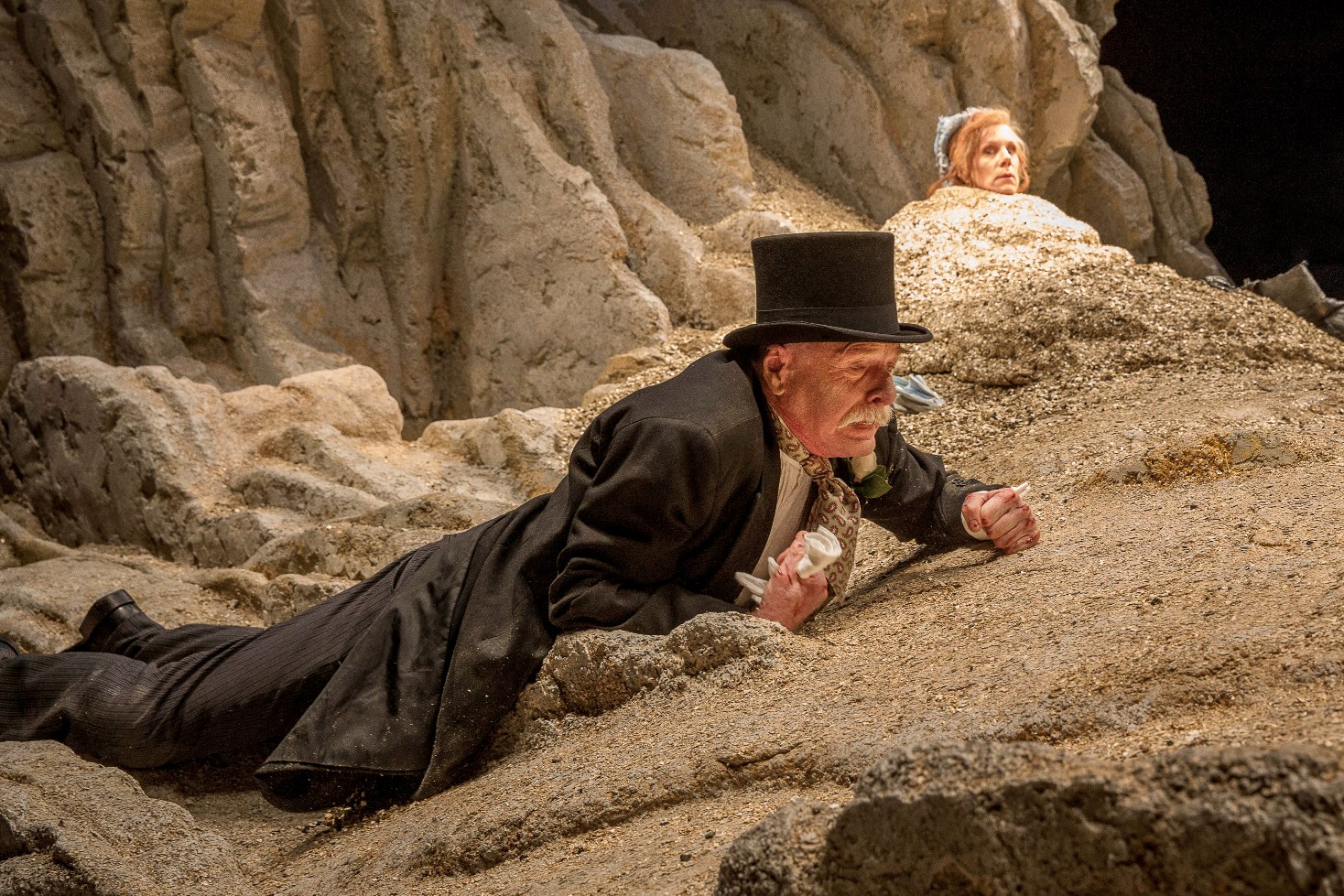Happy Days, Young Vic | reviews, news & interviews
Happy Days, Young Vic
Happy Days, Young Vic
The great Juliet Stevenson mesmerises in Beckett's tragic-heroic role of a lifetime

For those who never saw Samuel Beckett’s favoured performer Billie Whitelaw on stage as indomitable, buried-alive Winnie, peculiarly happy days are here again with another once-in-a-generation actress facing what Dame Peggie Ashcroft called “a ‘summit’ part”, the female equivalent of Hamlet.
This is, in short, the works: 90 plus minutes of perfectly modulated near-monologue in which Stevenson’s infinite variety, channelled with no false note by wise young director Natalie Abrahami, proves that you can’t draw any conclusion about our heroine’s predicament, only sheer wonder at her tenacious survival. Every moment is so authentic - despair, optimism, anger, fondness, pathos, comedy – that it’s impossible to leave the Young Vic’s dreamspace having come down on the side of any one of them.
We don’t know why Winnie is there, in the first act at least within reach of her life-support handbag and brolly-strike of mostly monosyllabic husband Willie (David Beames, bizarrely touching), bringing the shingle tumbling down the funnel between the Silurian cliffs of Vicki Mortimer’s masterly design, enduring a bell for waking and sleeping which is more of a jump-out-of-your-skin pneumatic drill, sometimes even welcoming the pitiless sun.
Certainly it’s a metaphor, but for what, especially when this Winnie’s “it is what it is” attitude feeds into our veins and hearts? The mire of depression, the blank repetitions of senile dementia – more resonant here in Willie’s case than in Winnie’s – are bound to chime most with today's audience, though probably less so for those of the 1960s, for whom the entombment of an unfulfilled housewife may have struck more of a chord.
 Humanity versus implacable time and eternity, that’s a crucial ingredient too, made the more monumental by Mortimer’s work with Paule Constable’s pitiless lighting. At times, too, Winnie is more like Lewis Carroll’s Alice, so alone that she addresses objects and makes them complicit participants in her little world.
Humanity versus implacable time and eternity, that’s a crucial ingredient too, made the more monumental by Mortimer’s work with Paule Constable’s pitiless lighting. At times, too, Winnie is more like Lewis Carroll’s Alice, so alone that she addresses objects and makes them complicit participants in her little world.
Yes, the protagonist could only be a woman, as Beckett’s account of his initial vision made abundantly clear; there are tendernesses and absurdities, so subtly etched by Stevenson, that a male actor would be hard pressed to evoke in the same way. The musicality and the poetry of Winnie’s seemingly random but devastatingly well structured observations to pass dead time are evoked by an actress of astonishing vocal range and dynamics.
As in a great two-movement symphony, the motifs we laugh at, however nervously, in the first hour – the fantasy Winnie weaves for herself of a passing couple who may be the Showers or the Cookers, the poignancy of early courtship remembered, the right time for the day’s rituals – come back to haunt us when we return from the interval to find Winnie buried up to her neck (Stevenson pictured above with Beames). Those eloquent, fluttering hand gestures – presumably worked on with movement director Joseph Alford - have had to go; the face laments its missing arms and breasts, observes its tongue and nose, but what comes out of the mouth are words in diminished tones.
The symmetrical coup – and in such a masterpiece, such things as spoiler notices aren’t necessary – is when the voice that manages to sing the Merry Widow waltz handily played by the music-box in the big black bag is Willie’s, making his wife’s day, in Act One, but finally Winnie’s in a last soft and low, ambiguous triumph.
I left legless and yet treading air, like our upward-aspiring heroine, wanting to see as many actresses as possible in the role, night after night. Lindsay Duncan and Harriet Walter would be good candidates; so would Glenn Close and Meryl Streep, who has lamented the dearth of strong roles for older actresses. Well, here perhaps is the tragic-heroic benchmark. And though I’m sure all those ladies would bring different insights, none could possibly outshine Stevenson.
The future of Arts Journalism
You can stop theartsdesk.com closing!
We urgently need financing to survive. Our fundraising drive has thus far raised £49,000 but we need to reach £100,000 or we will be forced to close. Please contribute here: https://gofund.me/c3f6033d
And if you can forward this information to anyone who might assist, we’d be grateful.

Subscribe to theartsdesk.com
Thank you for continuing to read our work on theartsdesk.com. For unlimited access to every article in its entirety, including our archive of more than 15,000 pieces, we're asking for £5 per month or £40 per year. We feel it's a very good deal, and hope you do too.
To take a subscription now simply click here.
And if you're looking for that extra gift for a friend or family member, why not treat them to a theartsdesk.com gift subscription?
more Theatre
 The Maids, Donmar Warehouse review - vibrant cast lost in a spectacular-looking fever dream
Kip Williams revises Genet, with little gained in the update except eye-popping visuals
The Maids, Donmar Warehouse review - vibrant cast lost in a spectacular-looking fever dream
Kip Williams revises Genet, with little gained in the update except eye-popping visuals
 Ragdoll, Jermyn Street Theatre review - compelling and emotionally truthful
Katherine Moar returns with a Patty Hearst-inspired follow up to her debut hit 'Farm Hall'
Ragdoll, Jermyn Street Theatre review - compelling and emotionally truthful
Katherine Moar returns with a Patty Hearst-inspired follow up to her debut hit 'Farm Hall'
 Troilus and Cressida, Globe Theatre review - a 'problem play' with added problems
Raucous and carnivalesque, but also ugly and incomprehensible
Troilus and Cressida, Globe Theatre review - a 'problem play' with added problems
Raucous and carnivalesque, but also ugly and incomprehensible
 Clarkston, Trafalgar Theatre review - two lads on a road to nowhere
Netflix star, Joe Locke, is the selling point of a production that needs one
Clarkston, Trafalgar Theatre review - two lads on a road to nowhere
Netflix star, Joe Locke, is the selling point of a production that needs one
 Ghost Stories, Peacock Theatre review - spirited staging but short on scares
Impressive spectacle saves an ageing show in an unsuitable venue
Ghost Stories, Peacock Theatre review - spirited staging but short on scares
Impressive spectacle saves an ageing show in an unsuitable venue
 Hamlet, National Theatre review - turning tragedy to comedy is no joke
Hiran Abeyeskera’s childlike prince falls flat in a mixed production
Hamlet, National Theatre review - turning tragedy to comedy is no joke
Hiran Abeyeskera’s childlike prince falls flat in a mixed production
 Rohtko, Barbican review - postmodern meditation on fake and authentic art is less than the sum of its parts
Łukasz Twarkowski's production dazzles without illuminating
Rohtko, Barbican review - postmodern meditation on fake and authentic art is less than the sum of its parts
Łukasz Twarkowski's production dazzles without illuminating
 Lee, Park Theatre review - Lee Krasner looks back on her life as an artist
Informative and interesting, the play's format limits its potential
Lee, Park Theatre review - Lee Krasner looks back on her life as an artist
Informative and interesting, the play's format limits its potential
 Measure for Measure, RSC, Stratford review - 'problem play' has no problem with relevance
Shakespeare, in this adaptation, is at his most perceptive
Measure for Measure, RSC, Stratford review - 'problem play' has no problem with relevance
Shakespeare, in this adaptation, is at his most perceptive
 The Importance of Being Earnest, Noël Coward Theatre review - dazzling and delightful queer fest
West End transfer of National Theatre hit stars Stephen Fry and Olly Alexander
The Importance of Being Earnest, Noël Coward Theatre review - dazzling and delightful queer fest
West End transfer of National Theatre hit stars Stephen Fry and Olly Alexander
 Get Down Tonight, Charing Cross Theatre review - glitz and hits from the 70s
If you love the songs of KC and the Sunshine Band, Please Do Go!
Get Down Tonight, Charing Cross Theatre review - glitz and hits from the 70s
If you love the songs of KC and the Sunshine Band, Please Do Go!
 Punch, Apollo Theatre review - powerful play about the strength of redemption
James Graham's play transfixes the audience at every stage
Punch, Apollo Theatre review - powerful play about the strength of redemption
James Graham's play transfixes the audience at every stage

Add comment